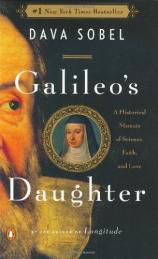Galileo's Daughter: A Historical Memoir of Science, Faith and Love
Review
Galileo's Daughter: A Historical Memoir of Science, Faith and Love
For those of you aware of the fact that Galileo (Galilei) , developed the first reliable telescope, dropped cannonballs off the leaning tower of Pisa in his study of gravity, and was convicted by the Inquisition for holding a heretical belief --- that the earth revolved around the sun --- kudos. However, did you also know that he had several illegitimate children and that one, Sister Maria Celeste, a Clarisse nun who died at age 33, and whom Galileo described as "a woman of exquisite mind, singular goodness, and tenderly attached to me," was a gifted writer whose many encouraging letters helped to keep the beleaguered genius on the path to his ultimate destiny?
Sister Marie Celeste's 124 surviving letters to her father --- never before translated into English until now --- reveal extensive details of life during the period and much about how greater social problems affected their individual worlds of study and meditation: family finances; Florentine and papal politics; the agonies of the bubonic plague; the Copernican revolution, which Galileo was championing as discreetly as was safe to do; as well as the hardships of monastic life, and the problems of preserving one's faith in a natural world in which Galileo was making remarkable scientific discoveries.
While Galileo tangled with the Church, Maria Celeste --- whose adopted name was a tribute to her father's fascination with the heavens --- provided moral and emotional support with her frequent letters, approving of his work because she knew the depth of his faith. In words both direct and poetic, author Dava Sobel breathes life into the man, his offspring, and the earth-centered world which Galileo changed forever, with nasty repercussions.
Unfortunately, Galileo's letters to her are lost, presumably destroyed by Maria Celeste's convent after her death. Dava Sobel, a former New York Times science writer, has done deep and detailed research to write a science biography with great attention to the story's historical and scientific relativities. Thanks to her succinct and efficient prose, Galileo's prostration before the Inquisition reveals more than simple science-versus-religion symbolism. His Dialogues, after all, argued for the Copernican view that the Earth moved around the Sun, which invoked the wrath of Pope Urban VIII, who had earlier been a loyal friend and supporter of Galileo. The subsequent trial in Rome ended with Galileo's recantation and his banishment first to Siena, and then to house arrest in Florence.
Never in Marie Celeste's short adult life did she leave her abbey's walls, but it is clear that she suffered greatly knowing what terrible things were being done to her father because of his realizations. She did what she could to help him and his cause, even transcribing his writings, copying over the Dialogue concerning the Two Chief World Systems, while managing convent affairs and serving as baker, nurse, seamstress, and apothecary. Galileo was often confined to bed with incapacitating illnesses and he treasured the medicines as well as the sweets and cakes his daughter provided. The love, trust and respect that passes between them gives us a whole new picture of this scientific forefather.
Thanks to her fascination with the topic, we all are enriched by the information Dava Sobel brings to GALILEO'S DAUGHTER, another great story about the woman behind the man and without whom there may have not been the breakthroughs that there were. Sister Mary Celeste's unwavering acceptance and love for her father and his work clearly helped him through the trials and tribulations necessary to change the world and the way we all look at it.
Reviewed by Jana Siciliano on January 22, 2011
Galileo's Daughter: A Historical Memoir of Science, Faith and Love
- Publication Date: November 1, 2000
- Genres: Biography, Nonfiction
- Paperback: 432 pages
- Publisher: Penguin (Non-Classics)
- ISBN-10: 0140280553
- ISBN-13: 9780140280555




